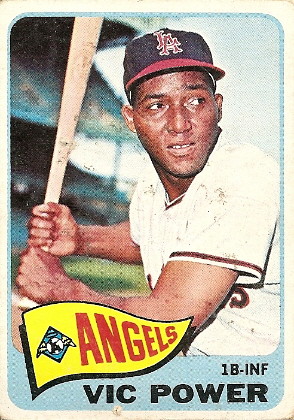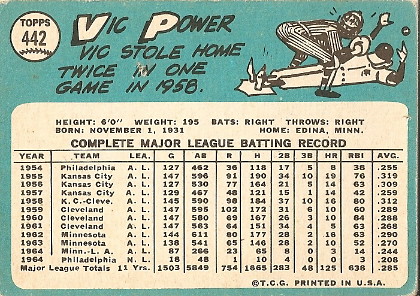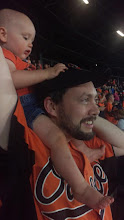
Vic soon caught the eye of Yankees scouts, who signed him in 1951. The notoriously slow-to-integrate pinstripers seem to have been put off by the unapologetic nature and sharp wit of the young first baseman. During his first season in their organization, he reportedly entered a restaurant and was informed that they did not serve colored people. He replied, "That's OK, I don't eat colored people. I just want rice and beans." Despite hitting .331 with 109 RBI in the minors in 1952, Power was not invited to the major league camp the following Spring. The writing was on the wall, and indeed New York traded him to the Athletics as part of an eleven-player deal in December of 1953. A popular rumor has the Yanks deciding to dump Vic because he had been dating a white woman.
Vic Power attracted lots of attention with his flashy play in the field. At the time, it was unheard of to catch the ball one-handed at first base, and it quickly became his calling card. Of course, now we take it for granted that this style of play increases flexibility and range, but Vic was instrumental in redefining his position. He was also an All-Star in two of his three full seasons with the Tribe, combining his doubles power with batting averages in the high .280s and continuing his slick work with the leather.
On the eve of the 1962 season, Power joined the Twins via another trade; pitcher Pedro Ramos was the outgoing Minnesota player. Again looking to make a good first impression, the first baseman was selected as the team's standout player of the year on the strength of a .290, 28 2B, 16 HR, 63 RBI stat line. After a decent encore in 1963, the 36-year-old showed his age the following year. In June, with his average at .222 and yet to hit a longball, Vic was traded to the Angels as part of a three-team deal. After batting .249 with 3 home runs in 68 games in L.A., he was shipped to the Phillies in September. You may be wondering why the card above has an Angels pennant and logo, in that case. As it so happens, the Halos reacquired Power in November, allowing Topps to use a photo of him that they'd ostensibly taken in the summer of '64. By that time, he was completely unable to live up to his name, stroking just nine extra-base hits in 197 at-bats in 1965. When the Angels released him the following April Fool's Day, it was a wrap for Vic Power. He carried a .284 batting average for his career.
The four-plus decades since Vic's career ended have cemented his legacy as one of the trailblazing Latin American players in Major League Baseball. He moved back to his native Puerto Rico and instructed future major leaguers such as Roberto Alomar, Jose Oquendo, Jerry Morales, Willie Montanez, and Jose Cruz, Sr. In 2005, just months after sharing memories of his career in the American documentary Beisbol, 78-year-old Vic Power succumbed to cancer.
Fun fact: Vic is one of 11 players to steal home plate twice in a game, having performed the feat on August 14, 1958. His first swipe gave the Indians a 9-7 lead in the eighth inning. After the Tigers tied the game in the ninth, Power stood on third in the bottom of the tenth with the bases loaded, two outs, and Rocky Colavito at bat. He took advantage of pitcher Frank Lary's struggles, breaking for home and catching him unaware with the game winner!



That Vic Power quote is one of the greatest of all-time, if he actually said it. Always thought it was great.
ReplyDeleteNight owl - even if he didn't, it makes for a great joke. From what I've read, it at least accurately portrays his attitude toward racial inequities in his prime years.
ReplyDeleteHe is my father, the actual quote according to what he told me was that they told him that they do not serve "negroes" and he replied; "I don't eat negroes I just want rice & beans"! He needs to be selected to the hall of fame, I do not know what it takes??
ReplyDeleteDid your father play at least 3 games with Yankees early I recall? joe bataan
DeleteDid your father play at least three games with the Yankees early in his career----joe bataan
ReplyDelete